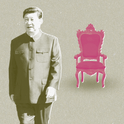"It is easy for an outsider to be cynical about the UN." David Rieff should know. He has been more cynical than most. His article (Prospect, October) contained a number of familiar jibes, but overall it marked a welcome departure from his previous tone. He thinks UN officials, including Kofi Annan, are acknowledging for the first time that everything is not OK. From our perspective, Rieff is acknowledging, for almost the first time, that we are not self-deluding hypocrites but people who have chosen to work in an imperfect institution, in the hope of being able to improve its performance.
Few UN officials today - and certainly not Annan - would defend the UN's record in Rwanda and Bosnia in the mid-1990s. On the UN's role in the 1994 Rwandan genocide, Annan commissioned and accepted an independent report, which flayed the secretariat, including Annan, for ignoring warnings from its commander on the spot, but said remarkably little about the behaviour of members of the security council, notably the US and Britain, who manoeuvred to avoid even using the word "genocide" lest it be held to give them a legal obligation to intervene under the 1948 genocide convention.
On the 1995 Srebrenica massacre in Bosnia, Annan was required by the general assembly to produce his own report, which Rieff accurately describes as "self-lacerating." What Rieff does not mention is Annan's words when he handed over responsibility to the Nato-led implementation force in Sarajevo in December 1995: "Each of us as an individual has to take his or her share of responsibility. No one can claim ignorance of what happened. All of us should recall how we responded, and ask: What did I do? Could I have done more? Did I let my prejudice, my indifference, or my fear overwhelm my reasoning? Above all, how would I react next time?"
This last question, addressed to himself and to the UN as a whole, has been the leitmotif of Annan's secretary generalship. In 1998 he warned that "next time may already be here," referring to Milosevic's attacks on civilians in Kosovo, which so vividly recalled the tactics used in Croatia and Bosnia earlier in the decade. He claimed to feel confident that if this time peaceful means did not stop the violence, "the security council will not be slow to assume its responsibility."
Alas, the security council did no such thing. In March 1999, when Nato launched its attack on Yugoslavia, Annan merely observed that, since under the charter the security council has primary responsibility for international peace and security, it should have been involved. Over the months that followed, he developed this into what some have called "the Annan doctrine," most fully expressed in his speech to the general assembly that September, when he warned the security council not to take its authority for granted: "If the collective conscience of humanity... cannot find in the UN its greatest tribune, there is a grave danger that it will look elsewhere for peace and for justice."
He was able, in the same speech, to congratulate the council on its "prompt and effective action in authorising a multinational force for East Timor" - largely because he himself, when the Indonesian army and its pliant militias unleashed their reign of terror, had been able to persuade President BJ Habibie not to oppose the restoration of order by an Australian-led force.
Soon afterwards the Canadian government took up this theme, hosting an "international commission on intervention and state sovereignty"(ICISS) which in December 2001 produced a well argued report entitled "The Responsibility to Protect." This responsibility, it said, belonged in the first instance to sovereign states, but when they failed - or when they themselves became the main threat to their own citizens' security - the responsibility devolved onto the international community, on whose behalf the security council should act. Neither the commission nor its report had any official UN status, but Annan has publicly given them his personal support. He even arranged for the two co-chairmen of the commission - Gareth Evans and Mohammed Sahnoun - to brief the members of the security council at an informal retreat in May 2002.
By then, public debate in the west, or at least in the US, had shifted away from threats of genocide and arguments about "humanitarian intervention" to focus on terrorism and WMD. But Annan has not allowed his attention to be so monopolised. In his recent report on the implementation of the millennium declaration he referred to "massacres of near genocidal proportions" in Congo and Liberia, and complained that "our response to them has been hesitant and tardy." He repeated this in his speech to the general assembly on 23rd September and called for a discussion on how to improve response as part of the general review of the international system.
But what about Iraq? Was not Saddam at least as bad as Milosevic? Should not Annan have been leading the charge for regime change, by military force if necessary?
My own feeling is that an international intervention to protect the victims of Saddam Hussein would have been justified in 1988, at the time of his genocide of the Kurds (although at that time, he enjoyed the support of all western powers). It would have been justified and should have happened in 1991 when, in violation of the recently concluded ceasefire, Saddam used helicopter gunships to massacre southern Iraqi Shi'i who rose against him.
But it was hard to take this seriously when it was advanced as a motive for war 12 years later, when all the arguments in between had focused on Saddam's failure to comply fully with the disarmament clauses of the ceasefire resolution, and the resulting fear that he must still be in possession of WMD. On this point Annan had made great efforts to bring Iraq into compliance. He believed, in common with the great majority of member states of the UN, that the renewed inspections under security council resolution 1441 (passed last November) offered hope of achieving results, and he did not believe that resorting to military action was necessary or justified in March 2003. Most especially, he believed that such action should not have been taken without a specific decision by the security council.
It is true that he was also troubled by the effects of 12 years of economic sanctions on the Iraqi population. He knew that much of the blame for these effects should properly be laid at the door of the regime, but he also knew that the UN was widely blamed by world public opinion. In short, he was as much caught up in the contradictions and dilemmas of dealing with Saddam as any other policymaker, and I cannot claim that he knew the answer. Rightly or wrongly, he did not believe the answer should be war.
Was this belief "fervently" shared by Sergio Vieira de Mello, as Rieff says? I am not so sure. What is certain is that when Sergio was asked just before the war, in his capacity as high commissioner for human rights, whether he thought human rights would be better or worse in Iraq after the war than before it, he had the honesty to reply that he thought they would probably be better. In April, he argued in the Wall Street Journal that the security council had never been able to deal effectively with Iraq because it failed to recognise the centrality of human rights and the connection between the aggressive behaviour of the regime towards its neighbours and its brutality to its own people. Such arguments do not necessarily imply that war was justified, but they do imply a stronger support for "regime change" as an objective than was commonly voiced by UN officials.
What matters is less the personal opinions of UN officials than the widespread feeling in the international community that something had gone wrong. Two permanent members of the security council felt justified in acting against the clear opposition of the others, and the great majority of UN member states. It was the most serious crisis the UN had faced during Annan's term of office, if not in its entire history. Even if one believed - as the British attorney general persuasively argued - that previous security council resolutions did provide a legal basis for action in the specific case of Iraq, the proclaimed willingness of the US to take unilateral action to ensure its own security at more or less any place or time clearly went far beyond any previous interpretation of the "inherent right of self-defence" which, according to article 51 of the UN charter, all states enjoy "if an armed attack occurs." If this doctrine were adopted by other states - and there are signs of this, in actions of the Israeli government and statements of the Russian defence minister - it could lead to just such an anarchic and dangerous world from which the UN was designed to save us.
Kofi Annan said as much in his speech on 23rd September. But he also said that "it is not enough to denounce unilateralism, unless we also face up squarely to the concerns that make some states feel uniquely vulnerable, since it is those concerns that drive them to take unilateral action. We must show that those concerns can, and will, be addressed effectively through collective action." Even more explicitly, he said that members of the security council might "need to begin a discussion on the criteria for an early authorisation of coercive measures to address certain types of threats - for instance, terrorist groups armed with WMD."
In other words, he broadened the warning he had already given the council about "humanitarian intervention" in 1999, now applying it to military action undertaken with a different justification, namely the need to act pre-emptively against certain threats because to wait for them to materialise would be almost suicidal. "If institutionalised rules and mechanisms do not exist, states will resort to other means to reduce or eliminate threats to their way of life - or to their very existence."
The challenge is very clear. Either, in a relatively short space of time (2005 has been suggested as a deadline) the international community agrees on credible rules about the use of force, giving a reasonable assurance that it will not be used arbitrarily and unilaterally but collectively, and only when really necessary, or we must resign ourselves to going back to a world uncomfortably like that of the 1930s.
Can such an agreement be reached through the mechanisms of the UN, and can those mechanisms be modified in such a way as to make such an assurance credible? Clearly, no one can take that for granted, but Rieff himself seems to concede, at the end of the article, that it is more likely to be done through the UN than in any other way: "No one seems to have a better idea."
In other words, despite the scorn Rieff pours on my colleague Shashi Tharoor, the fact that the UN already exists is an important argument in its favour, and the fact that the Manchester Guardian (as it then was) said the same about the League of Nations in 1928 does not refute it, as Rieff seems to think. The Guardian was right. The creation of the league had put "man's hope for peace and his nobler ambitions on a new basis." Those hopes and ambitions were disappointed. The brainchild of Woodrow Wilson was allowed to fail and, after six years of appalling carnage, the world followed another US president, Franklin D Roosevelt, in making a second attempt. The UN was designed to avoid some of the failings of the league, notably by binding the main powers of the time firmly into its structure and giving them special responsibilities. Yes, many things have changed since then, among them the pecking order among the powers. But can we really say, as Rieff does, that "there is nothing in the UN's founding documents or institutional structures that is relevant to the current crisis"?
Annan is now calling for a return to the founding principles of the UN, and he wants to adapt its structures and methods to the demands of a new century. That is surely better than despair.












